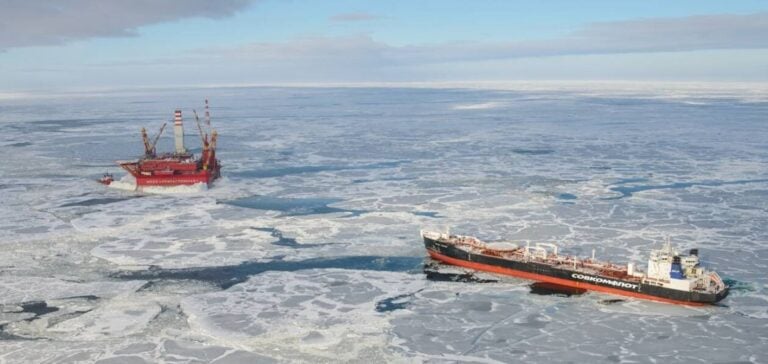Russia is exploring new routes to maintain its oil exports in the face of sanctions imposed by the United States and the European Union.
One recent strategy is to use the Northern Sea Route to transport crude oil to China, a crucial market for Moscow.
Strategic Change
This Arctic route, which is shorter than the traditional route via the Suez Canal, reduces transport times by an average of 10 days.
In July 2023, Russia’s crude oil exports by sea reached their lowest level since December 2022, mainly due to restrictions imposed by the G7 and the reinstatement of Russian refineries after Ukrainian drone attacks.
Russia’s ability to maintain its oil exports is crucial to its economy, especially after the G7’s decision to cap the price of Russian oil at $60 per barrel to limit the revenues used to finance the conflict in Ukraine.
The sanctions affect not only oil exports, but also ships and their owners.
Sanction Challenges
Sanctions have led to a significant reduction in the volumes carried by sanctioned vessels.
For example, 40 tankers sanctioned by the Office of Foreign Assets Control (OFAC) carried only 400,000 tonnes of Russian oil between April and June, compared with 5.8 million tonnes between January and March, according to the Clean Air and Energy Research Center.
Despite these restrictions, Russian authorities continue to look for ways to optimize trade routes.
The increased use of the Northern Sea Route in summer shows their willingness to find viable alternatives.
Crude oil exports from Russia’s Arctic and Baltic ports to China reached 10.4 million barrels in the 2023 summer season, compared with just 484,000 barrels in 2022.
A Promising Road
There are several advantages to using this Arctic route.
In addition to reducing transport time, it also reduces dependence on non-Russian shipping services.
By bypassing the main channels controlled by Western nations, Russia can circumvent some of the most punitive sanctions.
S&P Global Market Intelligence market expert Jeremy Domballe notes that sanctioning ships may be more effective than sanctioning shipowners, as owners can transfer ownership to non-sanctioned entities.
However, the vessels themselves, once sanctioned, find it much more difficult to operate.
Future prospects
As Russia continues to strengthen its Arctic infrastructure and develop its maritime capabilities, the Northern Sea Route could become a key trade route, not only for oil, but also for other exports.
The rise of this route could redefine global trade routes and offer Russia a new avenue for trade with Asia.






















